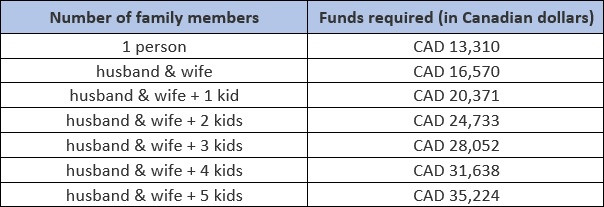
Proof of Funds (PoF) refers to a financial requirement for immigrants applying to migrate to Canada. When you apply for a visa or permanent residency in Canada, you are required to demonstrate that you have enough money to support yourself and your family while living in Canada – in the initial days until you receive your provincial health card. This is to ensure that you won’t become a burden on the Canadian government or its social programs.
The specific amount of money required for PoF will depend on the size of your family and the type of immigration program you are applying for. Generally, the Canadian government sets a minimum amount that you must have, based on the number of people in your family. Showing proof of funds is an important part of the immigration process because it helps to ensure that immigrants can support themselves and their families without relying on Canadian social programs. It also helps reduce the likelihood of financial hardship and poverty, which can create stress and strain on individuals and their families.
The Canadian government accepts a variety of financial resources as proof of funds (PoF) that can be used to support an application for a visa or permanent residency in Canada. The funds must be easily accessible and readily available to the applicant, and can include the following:
However, some assets cannot be used as proof of funds such as:
In summary, only certain types of financial resources are accepted as proof of funds for immigration to Canada. These resources must be easily accessible, readily available, and in a form that can be quickly converted to cash. It’s important to carefully review the Canadian government’s guidelines to ensure that you provide acceptable proof of funds when applying for a visa or permanent residency.
Individuals who apply for a visa or permanent residency in Canada are required to show proof of funds to demonstrate that they have the financial means to support themselves and their dependents while in Canada. However, there are some exceptions where individuals may not need to show proof of funds. These include:
It’s important to note that while some immigration programs may not require proof of funds, it’s always a good idea to have financial resources available to support oneself and dependents while in Canada. This can help with the settlement process and make the transition to a new country smoother.
When calculating proof of funds (PoF) requirement, the government of Canada considers an individual’s family members, including their spouse or common-law partner and any dependent children.
Who is a spouse? A spouse is defined as a person who is legally married to the applicant and the marriage is recognized by Canadian law.
Who is a Common-Law Partner? A common-law partner is a person who has been living with the applicant in a conjugal relationship for at least one year, or for at least 12 consecutive months with brief separations for work, education, or family reasons.
Who are Dependent Children? Dependent children are those who are under the age of 22 and who are not married or in a common-law relationship. In some cases, children who are over the age of 22 may be considered dependent if they have a physical or mental condition that makes them dependent on their parents.
Other family members, such as parents, siblings, grandparents, aunts, uncles, and cousins are not considered as part of an applicant’s family unit for PoF purposes. The below table shows the PoF requirement based on family size.

Contact us today to know if you qualify to migrate to Canada. Check out Owlspriority Immigration’s Canada Settlement Resources to learn about finding employment in Canada, making your initial days stress-free, etc.